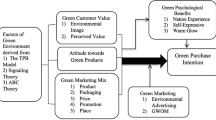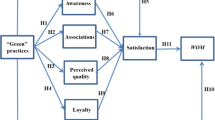Abstract
The study discusses the influence of greenwash on green word-of-mouth (green WOM) and explores the mediation roles of green perceived quality and green satisfaction. The research object of this study focuses on Taiwanese consumers who have the experience to purchase information and electronics products in Taiwan. This research utilizes structural equation modeling to undertake an empirical study. The results indicate that greenwash negatively affects green WOM. Besides, this paper proves that greenwash negatively impacts green perceived quality and green satisfaction which would positively influence green WOM. This study demonstrates that green perceived quality and green satisfaction mediate the negative relationship between greenwash and green WOM. It means that greenwash does not only have a directly negative effect on green WOM, but also have an indirectly negative effect on it via green perceived quality and green satisfaction. Thus, this study suggests that companies should decrease their greenwash behaviors and enhance their consumers’ green perceived quality and green satisfaction to increase their consumers’ green WOM.


Similar content being viewed by others
References
Aaker, D.A.: Managing Brand Equity: Capitalizing on the Value of a Brand Name. The Free Press, New York (1991)
Aaker, D.A.: Building Strong Brands. The Free Press, New York (1996)
Athanassopoulos, A., Gounaris, S., Stathakopoulos, V.: Behavioural responses to customer satisfaction: an empirical study. Eur. J. Mark. 35(5/6), 687–707 (2001)
Babin, B.J., Lee, Y.K., Kim, E.J., Griffin, M.: Modeling consumer satisfaction and word-of-mouth: restaurant patronage in Korea. J. Serv. Mark. 19(3), 133–139 (2005)
Bitner, M.J.: Evaluating service encounters: the effects of physical surroundings and employee responses. J. Mark. 54(2), 69–82 (1990)
Boulding, W., Kalra, A., Staelin, R., Zeithaml, V.A.: A dynamic process model of service quality: from expectations to behavioural intentions. J. Mark. Res. 30(1), 7–27 (1993)
Bowen, J.T., Chen, S.L.: The relationship between customer loyalty and customer satisfaction. Int. J. Contemp. Hosp. Manag. 13(5), 213–217 (2001)
Brucks, M., Zeithaml, V.A., Naylor, G.: Price and brand name as indicators of quality dimensions for consumer durables. J. Acad. Mark. Sci. 28(3), 359–374 (2000)
Chang, C.H., Tu, C.Y.: Exploring store image, customer satisfaction and customer loyalty relationship: evidence from Taiwanese hypermarket industry. J. Am. Acad. Bus. 7(2), 197–202 (2005)
Chang, C.H.: The influence of corporate environmental ethics on competitive advantage: the mediation role of green innovation. J. Bus. Ethics 104(3), 361–370 (2011)
Chaniotakis, I.E., Lymperopoulos, C.: Service quality effect on satisfaction and word of mouth in the health care industry. Manag. Serv. Qual. 19(2), 229–242 (2009)
Chaudhuri, A.: Consumption emotion and perceived risk: a macro-analytic approach. J. Bus. Res. 39(1), 81–92 (1997)
Chen, Y.S.: The driver of green innovation and green image - green core competence. J. Bus. Ethics 81(3), 531–543 (2008a)
Chen, Y.S.: The positive effect of green intellectual capital on competitive advantages of firms. J. Bus. Ethics 77(3), 271–286 (2008b)
Chen, Y.S.: The drivers of green brand equity: green brand image, green satisfaction, and green trust. J. Bus. Ethics 93(2), 307–319 (2010)
Chen, Y.S., Chang, C.H.: Enhance green purchase intentions: the roles of green perceived value, green perceived risk, and green trust. Manag. Decis. 50(3), 502–520 (2012)
Chen, Y.S., Chang, C.H.: Enhance environmental commitments and green intangible assets toward green competitive advantages: an analysis of structural equation modeling (SEM). Qual. Quant. 47(1), 529–543 (2013a)
Chen, Y.S., Chang, C.H.: Managing green brand equity: the perspective of perceived risk theory. Qual. Quant., in press (2013b).
Chen, Y.S., Chang, C.H.: Towards green trust: the influences of green perceived quality, green perceived risk, and green satisfaction. Manag. Decis. 51(1), 63–82 (2013c)
Chen, Y.S., Chang, C.H.: Utilize structural equation modeling (SEM) to explore the influence of corporate environmental ethics: the mediation effect of green human capital. Qual. Quant. 47(1), 79–95 (2013d)
Chen, Y.S., Chang, K.C.: The nonlinear effect of green innovation on the corporate competitive advantage. Qual. Quant. 47(1), 271–286 (2013e)
Chen, Y.S., Lai, S.B., Wen, C.T.: The influence of green innovation performance on corporate advantage in Taiwan. J. Bus. Ethics 67(4), 331–339 (2006)
Cherry, M.A., Sneirson, J.F.: Beyond profit: rethinking corporate social responsibility and greenwashing after the BP oil disaster. Tulane Law Rev. 85(4), 983–1038 (1999)
Danaher, P.J., Roland, T.R.: Indirect financial benefits from service quality. Qual. Manag. J. 3(2), 63–75 (1996)
Erdem, T., Swait, J.: Brand equity as a signaling phenomenon. J. Consum. Psychol. 7(2), 131–157 (1998)
Fornell, C., Larcker, D.F.: Evaluating structural equation models with unobservable variables and measurement error. J. Mark. Res. 18(1), 39–50 (1981)
Geyskens, I., Steenkamp, J., Kumar, N.: A meta analysis of satisfaction in marketing channel relationships. J. Mark. Res. 36(2), 223–238 (1999)
Gillespie, E.: Stemming the tide of greenwash. Consum. Policy Rev. 18(3), 79–83 (2008)
Hair, J.F., Anderson, R.E., Tatham, R.L., Black, W.C.: Multivariate Data Analysis. Prentice-Hall, Upper Saddle River (1998)
Hamann, R., Kapelus, P.: Corporate social responsibility in mining in Southern Africa: fair accountability or just greenwash? Development 47(3), 85–92 (2004)
Hoedeman, O.: Rio + 10 and the greenwash of corporate globalization. Development 45(3), 39–42 (2002)
Horiuchi, R., Schuchard, R.: Understanding and Preventing Greenwash: A Business Guide. Futerra Sustainability Communications, London (2009)
Hoyer, W.D., Brown, S.P.: Effects of brand awareness on choice for a common, repeat-purchase product. J. Consum. Res. 17(2), 141–148 (1990)
Jiang, P., Rosenbloom, B.: Customer intention to return online: price perception, attribute-level performance, and satisfaction unfolding over time. Eur. J. Mark. 39(1/2), 150–174 (2005)
Kalafatis, S.P., Pollard, M.: Green marketing and Ajzen’s theory of planned behaviour: a cross-market examination. J. Consum. Mark. 16(4/5), 441–460 (1999)
Laufer, W.S.: Social accountability and corporate greenwashing. J. Bus. Ethics 43(3), 253–261 (2003)
Lee, Y.I., Chang, C.H., Chen, Y.S.: The influence of novelty, flexibility, and synergy of package tours on tourist satisfaction: an analysis of structural equation modeling (SEM). Qual. Quant. 47(4), 1869–1882 (2013)
Lyon, T.P., Maxwell, J.W.: Greenwash: corporate environmental disclosure under threat of audit. J. Econ. Manag. Strategy 20(1), 3–41 (2011)
Mai, L.W., Ness, M.R.: Canonical correlation analysis of customer satisfaction and future purchase of mail-order speciality food. Br. Food J. 101(11), 857–870 (1999)
Malhotra, N.K., Kim, S.S., Patil, A.: Common method variance in is research: a comparison of alternative approaches and a reanalysis of past research. Manag. Sci. 52(12), 1865–1883 (2006)
Martenson, R.: Corporate brand image, satisfaction and store loyalty: a study of the store as a brand, store brands and manufacturer brands. Int. J. Retail Distrib. Manag. 35(7), 544–555 (2007)
Molinari, L.K., Abratt, R., Dion, P.: Satisfaction, quality and value and effects on repurchase and positive word-of-mouth behavioral intentions in a B2B services context. J. Serv. Mark. 22(5), 363–373 (2008)
Oliver, R.L.: Conceptual issues in the structural analysis of consumption emotion, satisfaction, and quality: evidence in a service setting. Adv. Consum. Res. 21(1), 16–22 (1994)
Oliver, R.L.: Satisfaction: A Behavioral Perspective on the Consumer. McGraw-Hill, New York (1996)
Olsen, S.O.: Comparative evaluation and the relationship between quality, satisfaction, and repurchase loyalty. J. Acad. Mark. Sci. 30(3), 240–249 (2002)
Parasuraman, A., Zeithaml, V.A., Berry, L.L.: SERVQUAL: a multiple-item scale for measuring consumer perceptions of service quality. J. Retail. 64(1), 12–40 (1988)
Parguel, B., Benoît-moreau, F., Larceneux, F.: How sustainability ratings might deter ‘greenwashing’: a closer look at ethical corporate communication. J. Bus. Ethics 102(1), 15–28 (2011)
Peattie, K., Peattie, S., Ponting, C.: Climate change: a social and commercial marketing communications challenge. EuroMed J. Bus. 4(3), 270–286 (2009)
Podsakoff, P.M., MacKenzie, S.B., Lee, J.Y., Podsakoff, N.P.: Common method biases in behavioral research: a critical review of the literature and recommended remedies. J. Appl. Psychol. 88(5), 879–903 (2003)
Polonsky, M.J., Grau, S.L., Garma, R.: The new greenwash? Potential marketing problems with carbon offsets. Int. J. Bus. Stud. 18(1), 49–54 (2010)
Pomering, A., Johnson, L.W.: Advertising corporate social responsibility initiatives to communicate corporate image: inhibiting scepticism to enhance persuasion. Corp. Commun. 14(4), 420–439 (2009)
Qualls, W.J., Rosa, J.: Assessing industrial buyers’ perceptions of quality and their effects on satisfaction. Ind. Mark. Manag. 24(5), 359–368 (1995)
Ramus, C.A., Montiel, I.: When are corporate environmental policies a form of greenwashing? Bus. Soc. 44(4), 377–414 (2005)
Ruyter, K., Bloemer, J.: Customer loyalty in extended service settings. Int. J. Serv. Ind. Manag. 10(3), 320–336 (1999)
Self, R.M., Self, D.R., Bell-Haynes, J.: Marketing tourism in the Galapagos Islands: ecotourism or greenwashing? Int. Bus. Econ. Res. J. 9(6), 111–125 (2010)
Slaughter, P.: Avoid the pitfalls of greenwash. Home Furnish. Bus. 3(2), 32–36 (2008)
Snoj, B., Korda, A.P., Mumel, A.: The relationships perceived quality, perceived risk and perceived product value. J. Prod. Brand Manag. 13(3), 156–167 (2004)
Söderlund, M.: Customer satisfaction and its consequences on customer behaviour revisited: the impact of different levels of satisfaction on word-of-mouth, feedback to the supplier and loyalty. Int. J. Serv. Ind. Manag. 9(2), 169–188 (1998)
Swan, J.E., Oliver, R.L.: Postpurchase communications by consumers. J. Retail. 65(4), 516–533 (1989)
Sweeney, J.C., Soutar, G.N., Johnson, L.W.: The role of perceived risk in the quality-value relationship: a study in a retail environment. J. Retail. 75(1), 77–105 (1999)
TerraChoice: The Seven Sins of Greenwashing. TerraChoice Environmental Marketing Inc., Ottawa (2009)
TerraChoice: The Sins of Greenwashing. TerraChoice Environmental Marketing Inc., Ottawa (2010)
Zeithaml, V.A.: Consumer perceptions of price, quality, and value: a means-end model and synthesis of evidence. J. Mark. 52, 2–22 (1988)
Zeithaml, V.L., Berry, L.L., Parasuraman, A.: The behavioral consequences of service quality. J. Mark. 60(2), 31–46 (1996)
Zhang, X., Prybutok, V.: A consumer per-spective of e-service quality. IEEE Trans. Eng. Manag. 52(4), 461–477 (2005)
Acknowledgments
The authors are grateful for the funding of National Science Council in Taiwan for this study, and the project number of this study is NSC 101-2410-H-305-074-MY3.
Author information
Authors and Affiliations
Corresponding author
Rights and permissions
About this article
Cite this article
Chen, YS., Lin, CL. & Chang, CH. The influence of greenwash on green word-of-mouth (green WOM): the mediation effects of green perceived quality and green satisfaction. Qual Quant 48, 2411–2425 (2014). https://doi.org/10.1007/s11135-013-9898-1
Published:
Issue Date:
DOI: https://doi.org/10.1007/s11135-013-9898-1




